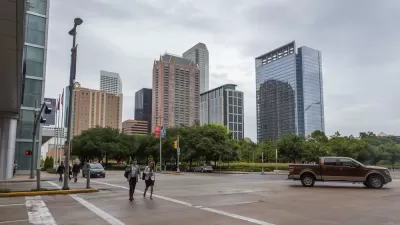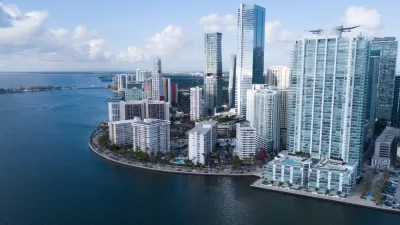A potentially radical point of view that must be considered by planners: moving the field forward will require soul searching that confronts an overcomes the disposition and exploitation that defined the past and continues to influence the future.

Annette Koh provides a treatise on "Decolonial Planning" a project that will require a "radical restructuring of finance, government, and our relationship with for-profit ventures."
Here, Koh connects the historical and the contemporary to describe the characteristics of planning as colonization and its continued influence:
In North America, European ideas about property and land rights allowed for the expulsion of indigenous peoples in the name of progress — with enclosure and privatization going hand in hand with public investment. Founding mythologies such as Thomas Jefferson’s yeoman farmer and the sturdy pioneer turning wilderness into productive farms valorized “improvement” as defined by colonial frameworks of capitalism and justified the displacement of those who had not properly utilized land by these imported standards. Fences and wheat signified “worthy” improvement, while relational knowledge of place, season, and kinship were invisible. Although disavowed today, urban renewal and the wholescale demolition of working class communities of color in the name of progress relied on the same disregard for social value. In present day discussions about the importance of activating “underutilized” public parks, planning yet again fails to see what already exists there in the rush to make spaces attractive to outside interests.
Koh lists some concepts from Hawai'i and New Zealand that could guide a reconstruction of legal and regulatory regimes, and redefine the frequently used term "highest and best use."
In fact, planners are already working on the practical project of decolonizing planning in Hawai'I, according to Koh:
I admit that I am not entirely sure how one goes about decolonizing a county planning department, but the head of Hawai‘i County’s planning department came to our Decolonizing Cities symposium in November 2018 and asked that very question. Planners at the Department of Hawaiian Homelands and in other community organizations are also figuring out how to sustain people’s connection to the ‘aina' by making operating expenses a self-generating fund that reinvests in local needs.
FULL STORY: Decolonial Planning in North America

Planetizen Federal Action Tracker
A weekly monitor of how Trump’s orders and actions are impacting planners and planning in America.

Congressman Proposes Bill to Rename DC Metro “Trump Train”
The Make Autorail Great Again Act would withhold federal funding to the system until the Washington Metropolitan Area Transit Authority (WMATA), rebrands as the Washington Metropolitan Authority for Greater Access (WMAGA).

The Simple Legislative Tool Transforming Vacant Downtowns
In California, Michigan and Georgia, an easy win is bringing dollars — and delight — back to city centers.

The States Losing Rural Delivery Rooms at an Alarming Pace
In some states, as few as 9% of rural hospitals still deliver babies. As a result, rising pre-term births, no adequate pre-term care and "harrowing" close calls are a growing reality.

The Small South Asian Republic Going all in on EVs
Thanks to one simple policy change less than five years ago, 65% of new cars in this Himalayan country are now electric.

DC Backpedals on Bike Lane Protection, Swaps Barriers for Paint
Citing aesthetic concerns, the city is removing the concrete barriers and flexposts that once separated Arizona Avenue cyclists from motor vehicles.
Urban Design for Planners 1: Software Tools
This six-course series explores essential urban design concepts using open source software and equips planners with the tools they need to participate fully in the urban design process.
Planning for Universal Design
Learn the tools for implementing Universal Design in planning regulations.
Smith Gee Studio
City of Charlotte
City of Camden Redevelopment Agency
City of Astoria
Transportation Research & Education Center (TREC) at Portland State University
US High Speed Rail Association
City of Camden Redevelopment Agency
Municipality of Princeton (NJ)





























